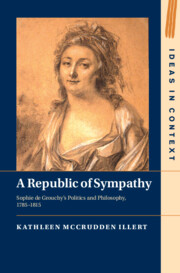Refine search
Actions for selected content:
13 results

A Republic of Sympathy
- Sophie de Grouchy's Politics and Philosophy, 1785–1815
-
- Published online:
- 18 December 2024
- Print publication:
- 05 December 2024
Chapter 3 - The Revolution, 1789–1793
-
- Book:
- A Republic of Sympathy
- Published online:
- 18 December 2024
- Print publication:
- 05 December 2024, pp 66-97
-
- Chapter
- Export citation
Chapter 2 - The Wheel, 1785–1789
-
- Book:
- A Republic of Sympathy
- Published online:
- 18 December 2024
- Print publication:
- 05 December 2024, pp 40-65
-
- Chapter
- Export citation
Conclusion
-
- Book:
- A Republic of Sympathy
- Published online:
- 18 December 2024
- Print publication:
- 05 December 2024, pp 224-228
-
- Chapter
- Export citation
Introduction
-
- Book:
- A Republic of Sympathy
- Published online:
- 18 December 2024
- Print publication:
- 05 December 2024, pp 1-15
-
- Chapter
- Export citation
Chapter 1 - The Letters, 1786
-
- Book:
- A Republic of Sympathy
- Published online:
- 18 December 2024
- Print publication:
- 05 December 2024, pp 16-39
-
- Chapter
- Export citation
Chapter 4 - The Republic, 1791–1793
-
- Book:
- A Republic of Sympathy
- Published online:
- 18 December 2024
- Print publication:
- 05 December 2024, pp 98-120
-
- Chapter
- Export citation
9 - Declarations of Rights
- from Part I - A Revolution in Rights?
-
-
- Book:
- The Cambridge History of Rights
- Published online:
- 22 January 2025
- Print publication:
- 28 November 2024, pp 200-227
-
- Chapter
- Export citation
2 - Rights and the Bourgeois Revolution
- from Part I - A Revolution in Rights?
-
-
- Book:
- The Cambridge History of Rights
- Published online:
- 22 January 2025
- Print publication:
- 28 November 2024, pp 45-70
-
- Chapter
- Export citation
Chapter 4 - Oratory in the French Revolution
-
- Book:
- Democracy, Theatre and Performance
- Published online:
- 17 May 2024
- Print publication:
- 27 June 2024, pp 90-116
-
- Chapter
- Export citation
4 - The Paradox of Republican Emancipation
-
- Book:
- Sharing Freedom
- Published online:
- 28 March 2024
- Print publication:
- 04 April 2024, pp 141-182
-
- Chapter
- Export citation
3 - Revolutionary Republicanisms
-
- Book:
- Sharing Freedom
- Published online:
- 28 March 2024
- Print publication:
- 04 April 2024, pp 104-140
-
- Chapter
- Export citation
20 - Interpreting a Symbol of Progress and Regression: European Views of America’s Revolution and Early Republic, 1780–1790
- from Part II - The British Colonies
-
-
- Book:
- The Cambridge History of the Age of Atlantic Revolutions
- Published online:
- 20 October 2023
- Print publication:
- 09 November 2023, pp 519-541
-
- Chapter
- Export citation
